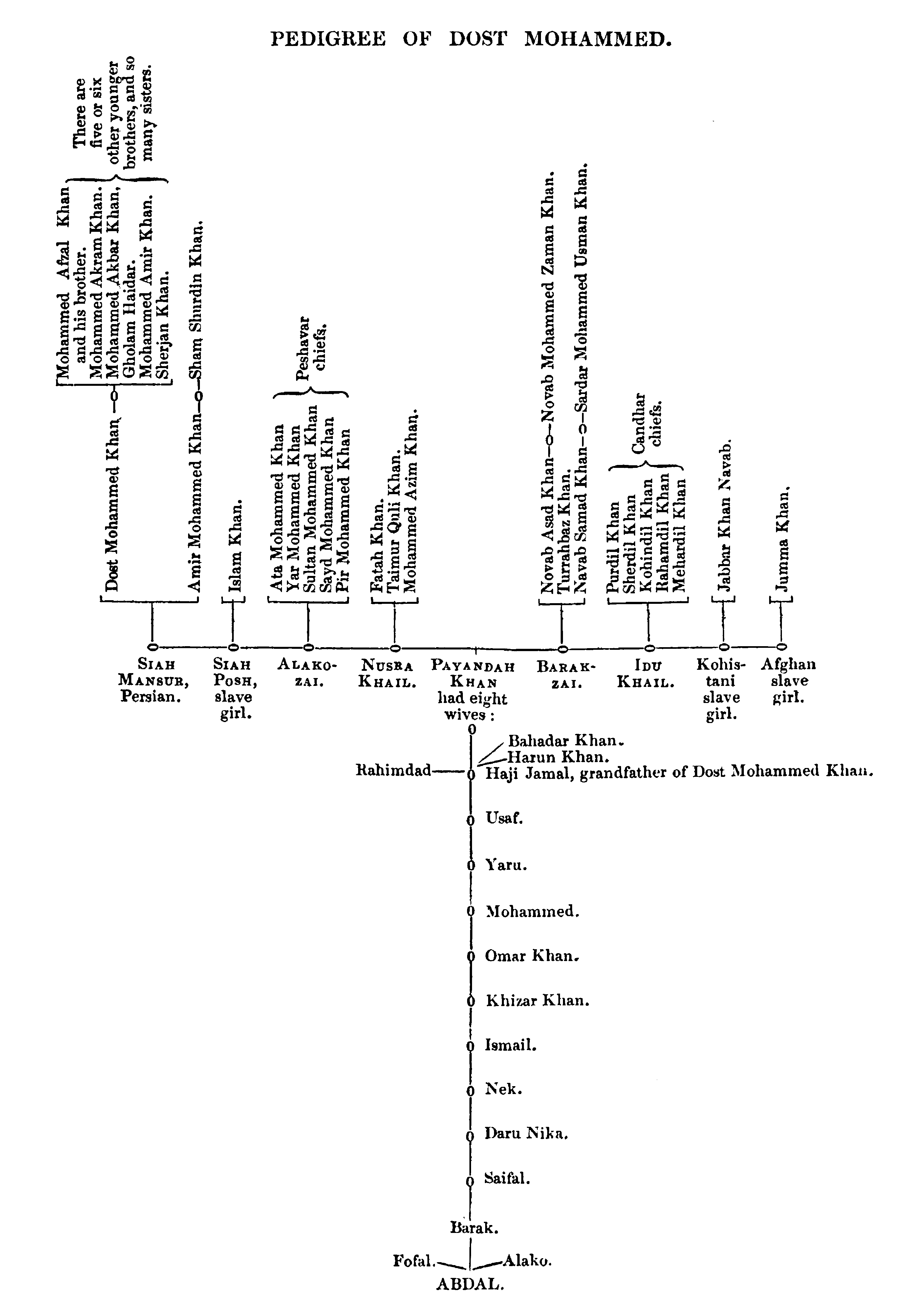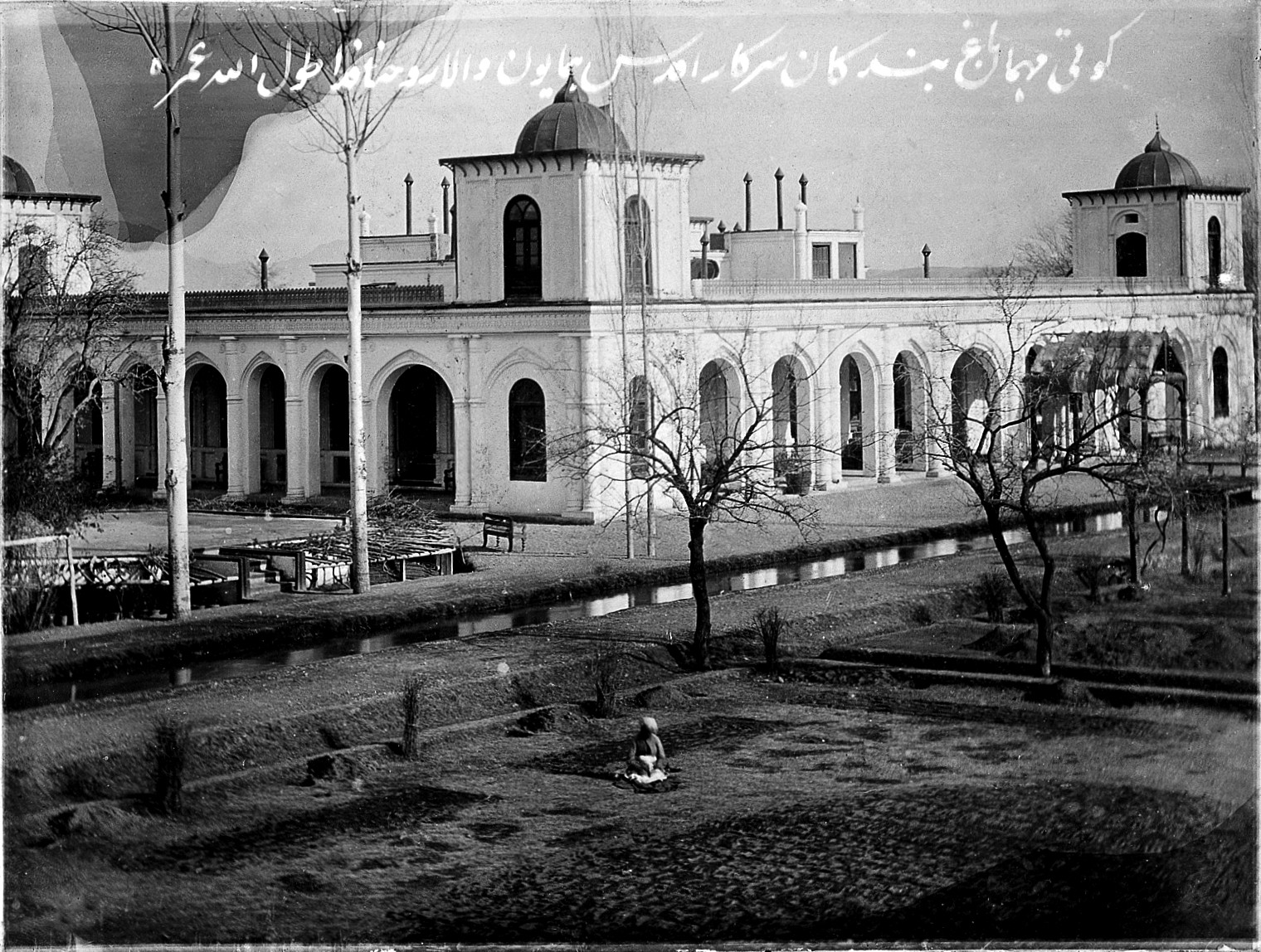|
Ghulam Muhammad Tarzi
''Sardar'' Ghulam Muhammad Khan Tarzi (born Kandahar, April 30, 1830 – 1900/1901) son of ''Sardar'' Rahim Dil Khan (and grandson of ''Sardar'' Payinda Khan Mohammadizi or ''Sardar'' Payinda Muhammad Khan) was a ruler of Kandahar. He was a Pashtun people, Pashtun soldier, poet, and military leader in Afghanistan. He is often credited with developing the traditional family name 'Tarzi,' which played a critical role in the history of Afghanistan. Early life Tarzi's family belonged to the royal sub-tribe known as the Mohammadzai, the most powerful and prominent of the Barakzai Dynasty. A soldier in his youth, he later took up poetry. Soon after, Amir Dost Mohammad Barakzai, Dost Muhammad integrated him into the community of state princes and learned scholars. Tarzi was related to both Amir Dost Muhammad and his successor, Amir Sher Ali Khan.Official Web-site of Mahmud Tarzi: Ghulam Muhammad Tarzi Biog.Link Chief Evidence shows Tarzi as a Chief in southern Afghanistan, most l ... [...More Info...] [...Related Items...] OR: [Wikipedia] [Google] [Baidu] |
Sardar Ghulam Mohammad Tarzi Of Afghanistan-cropped
Sardar, also spelled as Sardaar/Sirdar ( fa, سردار, , 'commander', literally 'headmaster'), is a title of royal family, royalty and nobility that was originally used to denote princes, noblemen, chiefs, kings and other Aristocracy (class), aristocrats. It has also been used to denote a chief or leader of a tribe or group. It is used as a Persian synonym of the title ''Emir'' of Arabic origin. In Modern era, modern history it is known as the title for Afghan Princes during the Kingdom of Afghanistan, Afghan Royal Kingdom, descending from the Sultan Mohammad Khan, Emir Sultan Mohammed Khan Telai. It was also used as a title of merit in the ''Nishan-i-Sardari'' for outstanding service in statecraft. The term and its cognates originate from Persian ''sardār'' () and have been historically used across Islamic Persia, Persia (Iran), the Ottoman Empire and Turkey (as "Serdar (Ottoman rank), Serdar"), Mesopotamia (now Iraq), Syria], South Asia (Pakistan, India, Bangladesh and ... [...More Info...] [...Related Items...] OR: [Wikipedia] [Google] [Baidu] |
Istanbul
Istanbul ( , ; tr, İstanbul ), formerly known as Constantinople ( grc-gre, Κωνσταντινούπολις; la, Constantinopolis), is the List of largest cities and towns in Turkey, largest city in Turkey, serving as the country's economic, cultural and historic hub. The city straddles the Bosporus strait, lying in both Europe and Asia, and has a population of over 15 million residents, comprising 19% of the population of Turkey. Istanbul is the list of European cities by population within city limits, most populous European city, and the world's List of largest cities, 15th-largest city. The city was founded as Byzantium ( grc-gre, Βυζάντιον, ) in the 7th century BCE by Ancient Greece, Greek settlers from Megara. In 330 CE, the Roman emperor Constantine the Great made it his imperial capital, renaming it first as New Rome ( grc-gre, Νέα Ῥώμη, ; la, Nova Roma) and then as Constantinople () after himself. The city grew in size and influence, eventually becom ... [...More Info...] [...Related Items...] OR: [Wikipedia] [Google] [Baidu] |
People Of The Second Anglo-Afghan War
A person ( : people) is a being that has certain capacities or attributes such as reason, morality, consciousness or self-consciousness, and being a part of a culturally established form of social relations such as kinship, ownership of property, or legal responsibility. The defining features of personhood and, consequently, what makes a person count as a person, differ widely among cultures and contexts. In addition to the question of personhood, of what makes a being count as a person to begin with, there are further questions about personal identity and self: both about what makes any particular person that particular person instead of another, and about what makes a person at one time the same person as they were or will be at another time despite any intervening changes. The plural form "people" is often used to refer to an entire nation or ethnic group (as in "a people"), and this was the original meaning of the word; it subsequently acquired its use as a plural form of per ... [...More Info...] [...Related Items...] OR: [Wikipedia] [Google] [Baidu] |
1900 Deaths
Nineteen or 19 may refer to: * 19 (number), the natural number following 18 and preceding 20 * one of the years 19 BC, AD 19, 1919, 2019 Films * ''19'' (film), a 2001 Japanese film * ''Nineteen'' (film), a 1987 science fiction film Music * 19 (band), a Japanese pop music duo Albums * ''19'' (Adele album), 2008 * ''19'', a 2003 album by Alsou * ''19'', a 2006 album by Evan Yo * ''19'', a 2018 album by MHD * ''19'', one half of the double album ''63/19'' by Kool A.D. * ''Number Nineteen'', a 1971 album by American jazz pianist Mal Waldron * ''XIX'' (EP), a 2019 EP by 1the9 Songs * "19" (song), a 1985 song by British musician Paul Hardcastle. * "Nineteen", a song by Bad4Good from the 1992 album '' Refugee'' * "Nineteen", a song by Karma to Burn from the 2001 album ''Almost Heathen''. * "Nineteen" (song), a 2007 song by American singer Billy Ray Cyrus. * "Nineteen", a song by Tegan and Sara from the 2007 album '' The Con''. * "XIX" (song), a 2014 song by Slipk ... [...More Info...] [...Related Items...] OR: [Wikipedia] [Google] [Baidu] |
1830 Births
Year 183 ( CLXXXIII) was a common year starting on Tuesday (link will display the full calendar) of the Julian calendar. At the time, it was known as the Year of the Consulship of Aurelius and Victorinus (or, less frequently, year 936 ''Ab urbe condita''). The denomination 183 for this year has been used since the early medieval period, when the Anno Domini calendar era became the prevalent method in Europe for naming years. Events By place Roman Empire * An assassination attempt on Emperor Commodus by members of the Senate fails. Births * January 26 – Lady Zhen, wife of the Cao Wei state Emperor Cao Pi (d. 221) * Hu Zong, Chinese general, official and poet of the Eastern Wu state (d. 242) * Liu Zan (Zhengming), Chinese general of the Eastern Wu state (d. 255) * Lu Xun Zhou Shuren (25 September 1881 – 19 October 1936), better known by his pen name Lu Xun (or Lu Sun; ; Wade–Giles: Lu Hsün), was a Chinese writer, essayist, poet, and literary critic. ... [...More Info...] [...Related Items...] OR: [Wikipedia] [Google] [Baidu] |
Barakzai Dynasty
The two branches of the Barakzai dynasty (, "sons of Barak") ruled modern day Afghanistan from 1823 to 1973 when the monarchy ended under Musahiban Mohammed Zahir Shah. The Barakzai dynasty was established by Dost Mohammad Khan after the Durrani dynasty of Ahmad Shah Durrani was removed from power. At the start of Barakzai rule in March 1823, the Afghans lost their former stronghold of Peshawar Valley to the Sikh Khalsa Army of Ranjit Singh at the Battle of Nowshera. The Afghan forces in the battle were supported by Azim Khan, half-brother of Dost Mohammad Khan. During the Barakzai era, Afghanistan saw much of its territory lost to the British in the south and east, Persia in the west, and Russia in the north. There were also many conflicts within Afghanistan, including the three major Anglo-Afghan wars and the 1928–29 civil war. History and background The Barakzai dynasty was the line of rulers in Afghanistan in the 19th and 20th centuries. Following the fall of the Dur ... [...More Info...] [...Related Items...] OR: [Wikipedia] [Google] [Baidu] |
19th-century Afghan Poets
The 19th (nineteenth) century began on 1 January 1801 ( MDCCCI), and ended on 31 December 1900 ( MCM). The 19th century was the ninth century of the 2nd millennium. The 19th century was characterized by vast social upheaval. Slavery was abolished in much of Europe and the Americas. The First Industrial Revolution, though it began in the late 18th century, expanding beyond its British homeland for the first time during this century, particularly remaking the economies and societies of the Low Countries, the Rhineland, Northern Italy, and the Northeastern United States. A few decades later, the Second Industrial Revolution led to ever more massive urbanization and much higher levels of productivity, profit, and prosperity, a pattern that continued into the 20th century. The Islamic gunpowder empires fell into decline and European imperialism brought much of South Asia, Southeast Asia, and almost all of Africa under colonial rule. It was also marked by the collapse of the large S ... [...More Info...] [...Related Items...] OR: [Wikipedia] [Google] [Baidu] |
Kingdom Of Afghanistan
The Kingdom of Afghanistan ( ps, , Dǝ Afġānistān wākmanān; prs, پادشاهی افغانستان, Pādešāhī-ye Afġānistān) was a constitutional monarchy in Central Asia established in 1926 as a successor state to the Emirate of Afghanistan. It was proclaimed by its first king, Amanullah Khan, seven years after he acceded to the throne. The monarchy ended in the 1973 Afghan coup d'état. History Emir Amanullah Khan was keen on modernizing Afghanistan, provoking several uprisings led by his conservative opponents. One such rebellion broke out while he was visiting Europe in 1927. He abdicated in favour of his brother Inayatullah Khan, who only ruled for three days before the leader of the rebellion Habibullāh Kalakāni took power and reinstated the Emirate. After 10 months, Amanullah Khan's Minister of War, Mohammed Nadir, returned from exile in India. His British-supported armies sacked Kabul, forcing Kalakāni to discuss a truce. Instead, Mohammed Nadir's forces ... [...More Info...] [...Related Items...] OR: [Wikipedia] [Google] [Baidu] |
Soraya Tarzi
Soraya Tarzi (Pashto/Dari: ملکه ثريا; November 24, 1899 – April 20, 1968) was the first queen consort of Afghanistan as the wife of King Amanullah Khan. She played a major part in the modernization reforms of Amanullah Khan, particularly in regard to the emancipation of women. Born in Syria, she was educated by her father, who was the Afghan leader and intellectual ''Sardar'' Mahmud ''Beg'' Tarzi. She belonged to the Mohammadzai Pashtun tribe, a sub-tribe of the Barakzai dynasty. As Queen of Afghanistan, she was not only filling a position – but became one of the most influential women in the world at the time. Owing to the reforms King Amanullah Khan instituted, the country's religious sects grew violent. In 1929, the King abdicated in order to prevent a civil war and went into exile. Their first stop was India, then part of the British Empire. Early life and family background Suraiya Shahzada Tarzi was born on 24 November 1899, in Damascus, Syria, then part o ... [...More Info...] [...Related Items...] OR: [Wikipedia] [Google] [Baidu] |
Mahmud Tarzi
Mahmud Tarzi ( ps, محمود طرزۍ, Dari: محمود بیگ طرزی; August 23, 1865 – November 22, 1933) was an Afghan politician and intellectual. He is known as the father of Afghan journalism. He became a key figure in the history of Afghanistan, following the lead of Mustafa Kemal Atatürk in Turkey by working for modernization and secularization, and strongly opposing religious extremism and obscurantism. Tarzi emulated the Young Turks coalition. Early years Tarzi was born August 23, 1865, in Ghazni, Afghanistan. An ethnic Pashtun, his father was Ghulam Muhammad Tarzi, leader of the Mohammadzai royal house of Kandahar and a poet. His mother, Sultanat Begum belonged to Popalzai tribe, and was the fourth wife of his father. In 1881, shortly after Emir Abdur Rahman Khan came to power, Mahmud's father and the rest of the Tarzi family were expelled from Afghanistan. They first travelled to Karachi, Sindh, where they lived from January 1882 to March 1885. They then moved ... [...More Info...] [...Related Items...] OR: [Wikipedia] [Google] [Baidu] |
Iran
Iran, officially the Islamic Republic of Iran, and also called Persia, is a country located in Western Asia. It is bordered by Iraq and Turkey to the west, by Azerbaijan and Armenia to the northwest, by the Caspian Sea and Turkmenistan to the north, by Afghanistan and Pakistan to the east, and by the Gulf of Oman and the Persian Gulf to the south. It covers an area of , making it the 17th-largest country. Iran has a population of 86 million, making it the 17th-most populous country in the world, and the second-largest in the Middle East. Its largest cities, in descending order, are the capital Tehran, Mashhad, Isfahan, Karaj, Shiraz, and Tabriz. The country is home to one of the world's oldest civilizations, beginning with the formation of the Elamite kingdoms in the fourth millennium BC. It was first unified by the Medes, an ancient Iranian people, in the seventh century BC, and reached its territorial height in the sixth century BC, when Cyrus the Great fo ... [...More Info...] [...Related Items...] OR: [Wikipedia] [Google] [Baidu] |
Abdur Rahman Khan
Abdur Rahman Khan GCSI (Pashto/Dari: ) (between 1840 and 1844 – 1 October 1901) was Emir of Afghanistan from 1880 to his death in 1901. He is known for uniting the country after years of internal fighting and negotiation of the Durand Line Agreement with British India. Abdur Rahman Khan was the first child and only son of Mohammad Afzal Khan, and grandson of Dost Mohammad Khan, founder of the Barakzai dynasty. Abdur Rahman Khan re-established the writ of the Afghan government after the disarray that followed the second Anglo-Afghan war. He became known as ''The Iron Amir'' because his government was a military despotism. This despotism rested upon a well-appointed army and was administered through officials subservient to an inflexible will and controlled by a widespread system of espionage. The nickname, ''The Iron Amir'', is also associated due to his victory over a number of rebellions by various tribes who were led by his relatives. One source says that during his reign t ... [...More Info...] [...Related Items...] OR: [Wikipedia] [Google] [Baidu] |


_1938.jpg)




